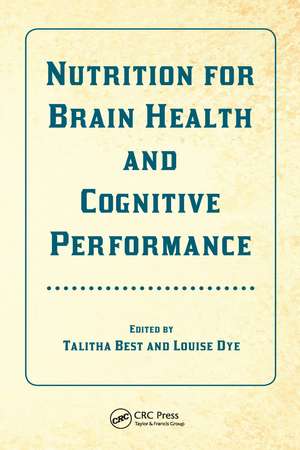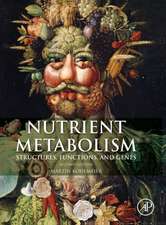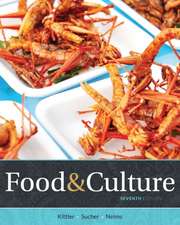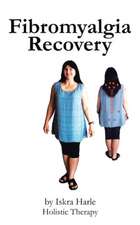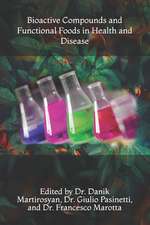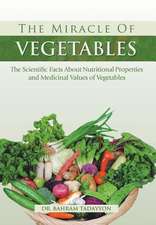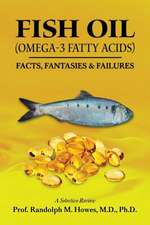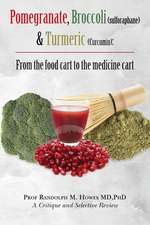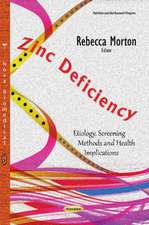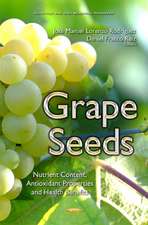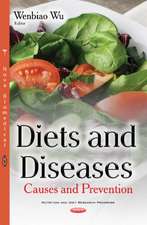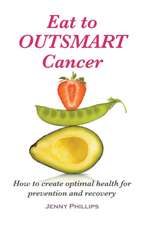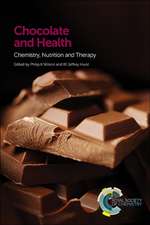Nutrition for Brain Health and Cognitive Performance
Editat de Talitha Best, Louise Dyeen Limba Engleză Paperback – 30 iun 2021
The book critically reviews the evidence surrounding the impact of dietary patterns and nutrition on brain function and cognitive performance. It covers diverse topics such as:
- Innovative new technologies that assess brain function
- Tools for measuring mood and its relation to nutrition
- How a diet rich in fruits and vegetables coupled with low consumption of meats can prevent cognitive decline in ageing adults
- Effects of glucose, omega 3s, vitamins and minerals, nutraceuticals and flavonoids on cognitive performance
- Cognitive benefits of herbal extracts such as ginseng, ginkgo biloba and green tea
- Use of technology such as neuroimaging and noninvasive brain stimulation (NBS) to capture nutrition effects on cognition and brain function
Presenting state-of-the-art scientific evidence, challenges, and potential applications within this exciting field, the book promotes and extends the research, teaches the process of research in this area, and promotes a collaborative understanding of the field between industry and academia. It gives you a balance of rigorous scientific information and analysis on the impact of dietary patterns, nutritional components and research processes to support brain health and performance claims and knowledge.
| Toate formatele și edițiile | Preț | Express |
|---|---|---|
| Paperback (1) | 432.42 lei 6-8 săpt. | |
| CRC Press – 30 iun 2021 | 432.42 lei 6-8 săpt. | |
| Hardback (1) | 1258.03 lei 6-8 săpt. | |
| CRC Press – 12 iun 2015 | 1258.03 lei 6-8 săpt. |
Preț: 432.42 lei
Nou
Puncte Express: 649
Preț estimativ în valută:
82.78€ • 85.14$ • 68.68£
82.78€ • 85.14$ • 68.68£
Carte tipărită la comandă
Livrare economică 18 februarie-04 martie
Preluare comenzi: 021 569.72.76
Specificații
ISBN-13: 9781032098579
ISBN-10: 1032098570
Pagini: 374
Ilustrații: 22 Illustrations, black and white
Dimensiuni: 156 x 234 x 20 mm
Greutate: 0.54 kg
Ediția:1
Editura: CRC Press
Colecția CRC Press
ISBN-10: 1032098570
Pagini: 374
Ilustrații: 22 Illustrations, black and white
Dimensiuni: 156 x 234 x 20 mm
Greutate: 0.54 kg
Ediția:1
Editura: CRC Press
Colecția CRC Press
Public țintă
Academic and Professional ReferenceCuprins
Big Picture: Nutrition for Brain Health. Good News Story: Nutrition for Brain Health. Nutrition and Cognition in the Context of Ageing: Role of Dietary Patterns. Genetics of Brain and Cognition and Their Interactions with Dietary and Environmental Factors. Process and Methods for Measuring Brain Function and Cognition. Cognitive Assessment: Principles, Paradigms and Pitfalls. Measuring Mood: Considerations and Innovations for Nutrition Science. The Story So Far: Foods and Nutrition for Performance across the Lifespan. Glycaemic Control and Cognition: Evidence across the Lifespan. Role of Long-Chain Omega-3 Fatty Acids in Cognitive and Emotional Development. Research on the Effects of Vitamins and Minerals on Cognitive Function in Older Adults. Herbal Extracts and Nutraceuticals for Cognitive Performance. Flavonoids and Cognitive Function: Evidence and Recommendations from Acute and Chronic Interventions. Technology and Brain Function. Using Technology to Improve Cognitive Function: Fact or Fiction? Use of Neuroimaging Techniques in the Assessment of Nutraceuticals for Cognitive Enhancement: Methodological and Interpretative Issues. Evidence, Innovations and Implications.
Notă biografică
Talitha Best is a researcher, practicing psychologist, and lecturer with a passion for solution-oriented thinking and process innovation. Dr. Best addresses critical innovation related to translation of research into workable solutions for researchers, practitioners and industry in the areas of nutrition, food systems and products, brain function and cognitive performance. Dr. Best received her PhD in clinical psychology and nutrition–cognition research from Flinders University, Adelaide, South Australia, and completed a joint postdoctoral position at the Nutritional Physiology Research Centre at University of South Australia (UniSA), Adelaide, and the Centre for Human Psychopharmacology, Swinburne University, Melbourne. Her research and clinical interests focus on the effects of nutrition to improve mood and neurocognitive function.
Louise Dye is Professor of Nutrition and Behaviour in the Human Appetite Research Unit in the School of Psychology, University of Leeds, United Kingdom. She received her BSc in Human Psychology from the University of Aston in Birmingham and her PhD in Psychopharmacology from the University of Leeds. She has held Medical Research Council and Royal Society post-doctoral fellowships in the United Kingdom and Europe, including a Marie Curie Professorial Fellowship in Jena, Germany. Professor Dye is a Chartered Health Psychologist and member of the British Psychological Society. She is Associate Editor of Nutritional Neuroscience and the European Journal of Nutrition and a member of the editorial board of Human Psychopharmacology.
Louise Dye is Professor of Nutrition and Behaviour in the Human Appetite Research Unit in the School of Psychology, University of Leeds, United Kingdom. She received her BSc in Human Psychology from the University of Aston in Birmingham and her PhD in Psychopharmacology from the University of Leeds. She has held Medical Research Council and Royal Society post-doctoral fellowships in the United Kingdom and Europe, including a Marie Curie Professorial Fellowship in Jena, Germany. Professor Dye is a Chartered Health Psychologist and member of the British Psychological Society. She is Associate Editor of Nutritional Neuroscience and the European Journal of Nutrition and a member of the editorial board of Human Psychopharmacology.
Descriere
This book addresses how nutrition and diet can influence cognitive function. It presents information on dietary supplementation, dietary patterns and lifestyle choices for maximizing cognitive health across the lifespan. The book focuses on sensitivity of the brain to nutritional environments, nutrient deficiencies and the impact of diet on cogn
